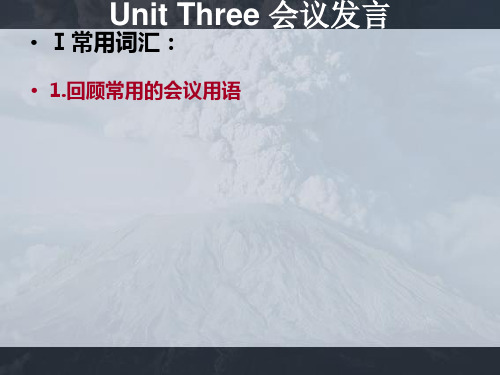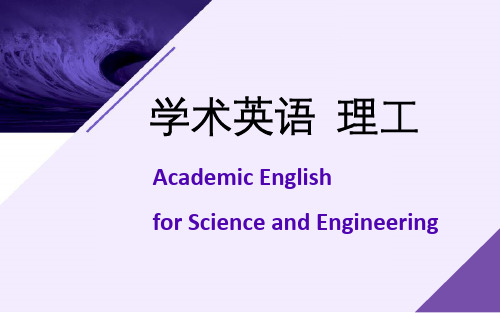学术英语(理工)详解答案_Unit 3 ppt课件
《学术英语》(理科)课后答案(完整版)

ContentsUnit 1 – Astronomy (2)Part I: Pre-listening (2)Part II: While Listening (2)Text A: Fun Facts about Astronomy (2)Text B: Shenzhou-10 Mission (3)Part III: After Listening (3)Part IV: Homework (3)Unit 2 – Biology (4)Part I: Pre-listening (4)Part II: While Listening (4)Text A: Secret of Life (4)Text B: Animal Intelligence (5)Part III: After Listening (5)Part IV: Homework (5)Unit 3 – Psychology (6)Part I: Pre-listening (6)Part II: While Listening (6)Text A: Discovering Psychology (6)Text B: Liespotting (7)Part III: After Listening (7)Part IV: Homework (7)Unit 4 – Geography (8)Part I: Pre-listening (8)Part II: While Listening (8)Text A: What Is Geography? (8)Text B: Mount Kailash – Axis of the World (9)Part III: After Listening (9)Part IV: Homework (9)Unit 5 – Economy (sic) (10)Part I: Pre-listening (10)Part II: While Listening (10)Text A: The Blue Economy (10)Text B: A Monkey Economy as Irrational asOurs (11)Part III: After Listening (11)Part IV: Homework (11)Unit 6 – Physics (12)Part I: Pre-listening (12)Part II: While Listening (12)Text A: What Is Physics? (12)Text B: Science of Figure Skating (13)Part III: After Listening (13)Part IV: Homework (13)Unit 7 – Computer Science (14)Part I: Pre-listening (14)Part II: While Listening (14)Text A: Computer Software (14)Text B: Computer Science Advice forStudents (15)Part III: After Listening (15)Part IV: Homework (15)Unit 8 – Chemistry (16)Part I: Pre-listening (16)Part II: While Listening (16)Text A: The History of DiscoveringElements (16)Text B: The Periodic Table of Elements (17)Part III: After Listening (17)Part IV: Homework (17)Unit 1 – AstronomyPart I: Pre-listeningC: Listening Exercise1. D – Mars.2. C – For finding their way across hugeareas of ocean.3. C – Almost every ancient culture knewof these five mysteries.4. A – Saturn, Jupiter, Venus, Mercury andMars.5. C – The study of stars.Part II: While ListeningText A: Fun Facts about Astronomy Exercise 1 – Global Understanding1.Two branches: (1) observationalastronomy and (2) theoreticalastronomy.2.Aspects: fun facts about (3) the sun(4) the moon(5) the stars(6) the planetsExercise 2 – Listening and Note-takingThe better notes are _A_, because:1.Good notes should consist of keywordsor very short sentences, not every word.e abbreviations and symbols thatmake sense to you can help you writedown notes quickly.3.Leave space between topics or ideas soyou can scan the page more easily later. Exercise 3 – In-depth Listening1.Mercury is the (1) second smallestplanet in the solar system and has (2)no moon. It can get as hot as (3) 800 °Cand cold as (4) 300 °C below zero. Oneyear on Mercury is equal to (5) 88 dayson Earth.2.Venus is the only planet that rotatesfrom (6) east to west. A year on thisplanet is equal to (7) 225 days on Earth.3.Earth is nearly (8) 93 million miles awayfrom the sun. It takes about (9) 16million horsepower to break the Earth’sgravitational pull.4.According to scientists, in around (10) 5billion years, a day on Earth will be (11)48 hours long and somewhere duringthat time the sun will explode.5.The planet Neptune was discoveredmore than (12) 150 years ago in 1846,and since then it still has to complete anorbit around the sun, as one Neptuneyear equals to (13) 165 Earth years.6.Pluto’s size is very small which madescientists demote it to a (14) dwarfplanet status.Text B: Shenzhou-10 MissionExercise 1 – Global Understanding1.June 24th.2.China hasn’t set up a permanent spacestation.Exercise 2 – Listening for Details1.False2.True3.Not GivenExercise 3 – Compound Dictation1.blasted off2.docked3.conduct experiments4.June 20th5.gave a lecture6. a manual docking procedure7.spoke8.two-way video link9.flew around10.the modulePart III: After ListeningPart IV: HomeworkA – Listening Task1.supremacy2.gesture3.vowed4.hostile5.decade6.mission7.spotted8.It was five kilometers from base andthey were running dangerously short oftime9.The orange soil looked like evidence ofrecent volcanic activity 10.In just half an hour, Schmitt and Cernangathered all the orange soil they couldlay hands onUnit 2 – BiologyPart I: Pre-listeningA: Talk about the Topic1.Hummingbird (c); Marmoset (a); Ostrich(d); Sloth (b); Venus flytrap (g); Cheetah(f); Bamboo (h); Rafflesia (e)2.as sly as a fox; as timid as a hare; ascheerful as a lark; as silly as a goose; asgreedy as a wolf; as proud as a peacock;as strong as a horse; as brave as a lion;as gentle as a lamb; as stubborn as amule; as busy as a bee; as blind as a bat C: Listening Exercise1. D – Hostess and guest.2. B – Genetically modified organism.3. A – Corns with a 4-digit PLU code.4. C – Because there is no proof that GMfoods are safe.5. C – From PLU code on the produce. Part II: While ListeningText A: Secret of LifeExercise 1 – Global Understanding1.nucleus2.mush3.membranes4.protein5.energy6.chromosomesExercise 2 – Listening and Note-taking1.frogspawn2.divide and divide3.replicating4.specialize5.body parts6.true of us7. a single cell8.two fundamental rules of life9.made of cells10.other cells11.what life wasExercise 3 – In-depth Listening1.17th2.Robert Hooke3.microscope4.snowflakes5.natural fibers6.mid-19th7.resurfaced8.well-engineered9.exposeText B: Animal IntelligenceExercise 1 – Global Understanding1. B – To prove that dolphins are thinkingspecies.2. C – Self-awareness.Exercise 2 – Listening for Details1.True2.Not Given3.False4.True5.FalseExercise 3 – Compound Dictation1.reacting2.another dolphin3.back and forward4.testing to see5.the same things6.neck stretches7.marked part8. a mirror9. a toolPart III: After ListeningPart IV: HomeworkA – Listening Task1.filtered sunlight2.fade3.sensitive4.evaporate5.pebbles6.moist7.snippers8.start up9.indestructible10.raise alarm11.a shadier location 12.polluted water13.reddish14.decaying or mushy15.indoor environmentsUnit 3 – PsychologyPart I: Pre-listeningA: Talk about the Topic2.1-d, 2-a, 3-f, 4-g, 5-c, 6-e, 7-h, 8-b C: Listening Exercise1. B – He has just moved to a new place.2. A – He should take Fido to the vet.3. D – He will put his dog on medication.4. A – Dog emotions are quite similar tothe emotions of humans.5. C – Harry is an expert on brain scienceof humans and dogs.Part II: While ListeningText A: Discovering Psychology Exercise 1 – Global Understanding1.behavior of individuals2.mental processes3.dispositional factors4.situational factors5.experimental psychology laboratory6.Principles of PsychologyExercise 2 – Listening and Note-taking1.sci entific study2.res earch3.pred ict & (ctrl) control behav ior4.gene tic5.att itudes, ment al6.sens ory stimul ation7.rew ards, act ionsExercise 3 – In-depth Listening1.18792.Germany3.first experimental psychologylaboratory4.18836.first American psychological laboratory7.18909.psychological text10.Principles of PsychologyText B: LiespottingExercise 1 – Global Understanding1. D – He peppered his account with alittle too much detail.2. B – A fake smile will betray a liar. Exercise 2 – Listening for Details1.Not Given2.False3.False4.True5.FalseExercise 3 – Compound Dictation1.lower2.pause3.pepper4.detail5.chronological6.backwards7.words8.gesturesPart III: After ListeningPart IV: HomeworkA – Listening Task1.signs of the condition2.low levels of light3.severe form4.thoughts of death or suicide5.designed6.sleep7.active8.sugary water9.more depressed10.least11.blue and white light12.dim red 13.signals14.natural sleep-wake cycle15.recommendation16.exposure17.bluish18.reddishUnit 4 – GeographyPart I: Pre-listeningA: Talk about the Topic1.a. 4.5 to 4.6 billion yearsb.149,597,870 kmc.384,403.1 kmd.Mt. Everest, Asia: 8844.43 me.Dead Sea: -422 mf.Mariana Trench, Western PacificOcean: 11,034 mg.56.7°C (Greenland Ranch in DeathValley, California, July 10, 1913)h.-89.2°C (Vostok, Antarctica, July 21,1983)2.1-a; 2-c; 3-f; 4-b; 5-e; 6-d; 7-gC: Listening Exercise1. D – New Zealand.2. C – The south of the country can bewarm in summer.3. C – A map showing geographicalfeatures.4. B – The coverage of oceans.5. C – She wants to know more aboutgeography.Part II: While ListeningText A: What Is Geography?Exercise 1 – Global Understanding1.Cultural geography focusing on peopleand cultures.2.Physical geography focusing on planetEarth. Exercise 2 – Listening and Note-takingFive these of geographyA. LocationB. PlaceC. Human-environment Interaction1. Humans depend on the environment2. Humans modify the environment3. Humans adapt to the environmentD. MovementE. Region1. Formal regions2. Functional regions3. Vernacular regionsExercise 3 – In-depth Listening1.earth2.to write3.climates4.plant and animal distributionputerized mapping6.data analysisText B: Mount Kailash – Axis of the World Exercise 1 – Global Understanding1. A – Because it matches the legend ofthe axis of the world.2. D – Because it is the most importantpilgrimage site in Tibet.Exercise 2 – Listening for Details1.False2.True3.Not Given4.False5.FalseExercise 3 – Compound Dictation1.pilgrimage site2.Buddha’s e nlightenment3.newly dressed altar4.prayer flags5.end up straight6.wind horsesPart III: After ListeningPart IV: HomeworkA – Listening Task1.233 countries2. a bit ambiguous3.semi-presidential republic4.6,592,800 square miles5.northern part of Asia6.11 different time zones7.climate conditions8.energy and minerals9.greatest forest reserves10.unfrozen freshwater11.ninth most populous12.lungs of Europe13.by volume 14.780 species of birds15.third largest economy16.fastest aging country17.Three Gorges Dam18.at a country’s disposalUnit 5 – Economy (sic)Part I: Pre-listeningA: Talk about the Topicpete with one another; positive; aninvisible hand2. a long time; stall along the wayC: Listening Exercise1. B – He is interested in making modelboats.2. C – She is considerate and thoughtful.3. A – It will help children learn the valueof money.4. D – He will give Jacky a regularallowance soon.5. D – Saving money for larger costs willhelp children learn how to budget. Part II: While ListeningText A: The Blue EconomyExercise 1 – Global Understanding1.expensive2.not smart3.creative4.healthy and happy5.what we did not know we have Exercise 2 – Listening and Note-taking1.healthy and naturalanic3.solar energy4.biodegradable5.palm oil6.destroy the rain forest7.subsidies8.tax moneypete with food10.damaging the climate11.expensive12.not smartExercise 3 – In-depth Listening1.Not Given2.True3.False4.TrueText B: A Monkey Economy as Irrational as OursExercise 1 – Global Understanding1. D – When they are facing a loss.2. A – People are irrational because theywant to make more money.Exercise 2 – Listening for Details1.10002.10003.04.5005.Play it safe6.20007.10008.09.50010.Take a riskExercise 3 – Compound Dictation1.different directions2.good or not3.switch4.loss mindset5.risky6.worrying7.losing stocks longer8.sell their housePart III: After ListeningPart IV: HomeworkA – Listening Task1.economic prosperity2.support strengthening3.premier forum4.lowering tariffs5.non-discriminatory6.greater participation7.integrated economic community8.critical energy sector9.interconnectivity10.renewablepletion of negotiations12.far-reaching trade agreement13.rules-based and high-standard14.mere short term15.multilaterial and bilateral partnershipsUnit 6 – PhysicsPart I: Pre-listeningA: Talk about the Topic1.1-f; 2-b; 3-e; 4-d; 5-g; 6-a; 7-h; 8-c C: Listening Exercise1. B – They are doing a physicalexperiment.2. C – Six.3. D – Judy helped to pinch the balloontight.4. B – Mike is very smart.5. A – They pumped some gas into theballoon.Part II: While ListeningText A: What Is Physics?Exercise 1 – Global UnderstandingTwo categories of physics:(1) Classical physics(2) Modern physicsMain purposes of learning physics:(1) To understand the world around people(2) To explain the universe at large Exercise 2 – Listening and Note-taking1.Definition2.motion of matter3.space and time4.energy5.force6.effects7.philosophy8.world9.classical10.modern11.Applications12.electromagnetism13.mechanics14.quantum physics Exercise 3 – In-depth Listening1.matter moves2.object attraction3.heat and energy4.mass-energy5.space-time6.electric chargesText B: Science of Figure Skating Exercise 1 – Global Understanding1. C – The science of figure skating.2. D – All of the above.Exercise 2 – Listening for Details1.False2.False3.True4.Not Given5.FalseExercise 3 – Compound Dictation1.action and reaction2.vertical velocity3.velocity4.higher5.spin6.extended7.slowly8.closer9.faster10.following11.Conservation of Angular Momentum Part III: After ListeningPart IV: HomeworkA – Listening Task1.powered by sun light2.20153.63 meters across4.200 square meters5.cells6.140 kilometers7.8,500 meters8.stops9.20 to 2510.autopilot 11.goal12.appliancesUnit 7 – Computer SciencePart I: Pre-listeningA: Talk about the Topic1.1-Wechat; 2-MSN; 3-Tencent QQ; 4-Sina Microblog; 5-Renren Network; 6-Instagram2.MSN, Tencent QQ, Renren Network,Sina MNicroblog, Instagram, Wechat C: Listening Exercise1. D – A research on the applications ofcomputers and Internet.2. C – Playing computer games.3. B – Computers can help edit jobapplication documents.4. C – Online shopping has become anessential part of our life.5. A – People may be cheated by someoneonline.Part II: While ListeningText A: Computer SoftwareExercise 1 – Global Understanding1. D – Software programs and theoperating system.2. B – A set of instructions that tells thecomputer what to do.Exercise 2 – Listening and Note-taking1.most of us don’t speak the ir language2.is like a translator3.the computer what to do4.personalized5.Mac6.Linux7.Operating system8.Software programs9. a computer store10.download from the InternetExercise 3 – In-depth Listening1.True2.FalseAn operating system can cover thebasics from saving files to fixingproblems.3.FalseYou can get computer software from acomputer store or download them fromthe Internet without the help ofcomputer engineers4.FalseSoftware programs can makecomputers personalized5.TrueText B: Computer Science Advice for StudentsExercise 1 – Global Understanding1. C – Advice for students on computerscience.2. A – Computer science is highlyinteractive.Exercise 2 – Listening for Details1.False2.True3.True4.Not GivenExercise 3 – Compound Dictation1.fallacies/misconceptions2.programming3.people4.business analysts5.discuss6.solve7.logical thinking8.capture things9.articulate10.connectingPart III: After ListeningPart IV: HomeworkA – Listening Task1.index of the web2.software programs3.webpages4.follow all the links5.chunk of the web6.hit return7.possible8.contain your keywords9.directly adjacent 10.spamming11.outside links point to itmitment13.impartial search results14.a snippet of the text15.related searches16.advertising business17.strive to18.cheetah’s top running speedUnit 8 – ChemistryPart I: Pre-listeningA: Talk about the Topic1.A, C, and E are chemical reactionsC: Listening Exercise1. A – In 1828.2. D – He created them from twoinorganic substances.3. C – People isolated it from living things.4. C – It proved that organic substancescan be created from inorganicsubstances.5. D – Atoms.Part II: While ListeningText A: The History of Discovering ElementsExercise 1 – Global Understanding1.diversity of natureplexity of man3.92 elements4.the most important codes5.making of the modern world Exercise 2 – Listening and Note-taking1.what an element is2.lead, copper, gold, silver, iron, mercury,tin3.metals4.earth, air, fire, and water5.16th6.metals into goldExercise 3 – In-depth Listening1.attempted2.electricity3.natural4.ultimately5.insight6.physics7.mysteries8.detective9.centuries10.struggled11.fascination12.destructionText B: The Periodic Table of Elements Exercise 1 – Global Understanding1. B – How the periodic table of elementswas discovered and its significance.2. B – It changes the way that everyonewould learn and understand theelements.Exercise 2 – Listening for Details1.True2.False3.Not Given4.True5.FalseExercise 3 – Compound Dictation1.18692.explain3.properties4.similarities5.patterns6.vertical7.resembled8.existence and properties9.rightPart III: After ListeningPart IV: HomeworkA – Listening Task1.green leaves2.grows underground3.for their taste4.traditionally for health reasons5.seeking to lose weight6.desire to eat7.reduce hunger8.Over six weeks9.each group 10.three-tenths of a gram11.normally eat12.especially true13.may be lost14.extend the effectiveness15.a tropical plant16.its medical possibilities17.earlier evidence18.brains of patients19.sixty to ninety-three years old20.rarely or never。
国际学术交流英语ppt课件

职务、学术成果、社会活动、其他个人信 息) • 3. 发言顺序 • 4. 邀请第一位演讲人
Task 1 介绍发言人
• Ⅰ Before listening, please read the useful patterns and expressions often used in introducing a a speaker in the data bank.
Unit Three 会议发言
• Ⅰ常用词汇:
• 1.回顾常用的会议用语
Unit Three 会议发言
• Ⅰ常用词汇:
• 1.会议用语
• Meeting
• 普通用词,词义广泛。指一般性的会议,可用于 各种场合。
• e.g. •
• 峰会 • a summit meeting • 参加会议 • attend a meeting
• a farewell meeting
• 联欢会
• a convivial meeting
• 筹备会议
• preparatory meeting
Unit Three 会议发言
• Ⅰ常用词汇:
• Conference
• (通常持续几天的大型正式)会议, 如政府工作会 议、国际学术交流会议、各国之间的协商、会谈 等。
• 研讨会、专题报告 symposium (pl.
symposia/symposium)
• is a kind of meeting, but if refers exclusively to the meetings for specialized academic discussion.
• The symposium on AIDS research lasted two days.
学术英语+医学+Unit3(课堂PPT)

Unit 3
Prevention and Treatment
Lead-in
of
Diseases
Task: Work in pairs and discuss the causes and treatments you
know of the following conditions.
Disease Flu Myopia Hepatitis
the trials for the Pan American Games • attended medical school, practiced as an internal
• Suggested answers
9
Unit 3
Text A
Prevention and Treatment
Critical reading and thinking
of
Diseases Topics for presentation
1. How was Terry’s life before she was diagnosed with (Pre. 1)
5
Unit 3
Prevention and
Lead-in
Treatment
of
Diseases Your experience when you fell ill last time
• Time • Visits to doctor • Diagnosis • Treatment
6
Unit 3
Prevention and Treatment
2
Unit 3
Prevention and Treatment of Diseases
学术英语(理工)Unit

into the literature.
03
Critically Thinking
Don't just accept the findings at face value; question the
methods, results, and conclusions.
Writing Skills: How to Write Scientific Papers
提高专业英语水平
培养批判性思维
通过学习专业词汇、语法和写作技巧,帮 助学生提高专业英语水平,能够阅读和理 解科技论文和文献。
通过课堂讨论和案例分析,培养学生的批 判性思维和问题解决能力,使他们能够独 立思考和分析科学问题。
增强学术交流能力
了解学科前沿
通过模拟学术会议、小组讨论和口头报告 等活动,提高学生的学术交流能力,包括 口头表达和书面表达能力。
Title and Abstract
Make sure the title is concise and descriptive, and the abstract summarizes the research objectives, methods, results, and conclusions.
03
Reading and Writing Skills in Academic English (Science and Engineering)
Reading Skills: How to Quickly Understand
Scientific Literature
01
Key Takeaways
concepts.
Common Expressions in Academic English (STEM)
学术英语unit 3

Nucleotide
• chloride , sulphide, • carbide, oxide, hydride
Polymorphism
• • • • -ism showing qualities typical of heroism Americanism
• medical condition or disease • Alcoholism • dwarfism
Flu
viruses
Myopia
prolonged close work, excessive reading viral (HBV, HCV, etc.), bacterial, parasitic, fungal infections alcohol, autoimmune, inherited
The disease
Multiple sclerosis
• • • • What is it? Causes ? Symptoms? Cure?
• Excrete • Secrete
• methyl • methane • Methanol
• Folic acid • Foliage
Disease
Causes
Treatments
Flu
Myopia Hepatitis
Disease
Causes
Treatments
rest, clear fluids, cool damp washcloth to reduce fever, warm blanket to calm chills, cough medicine, antiviral medications, usually no need of antibiotics
学术英语(理工)讲义+课后习题解答

Academic English for Science and Engineering
h
1
h
2
Unit 1 Choosing a Topic
Unit Contents
1 Deciding on a topic
2 Formulating a research question
3 Writing a working title
appropriate topics of each
h subject?
7
Unit 1 Choosing a Topic
1 Deciding on a topic
Topics Energy
Genetic engineering
Universe
Your narrower subtopics
Questions
5 be used to
(识别p)hpyositceanltliyal terrorists
6 deal the matter withstrhaimightforward (完全地)
7 start with a prceattpyability
(直截了当) question
8 beyond thtaerget
缺答案
h
11
Unit 1 Choosing a Topic
1 Deciding on a topic
l Additional questions for your understanding of Text 1
1 What does “unauthorized user” refer to?
This term covers the entire range of folks, from those involved in organized criminal activities to insiders who are pushing the limits of what they are authorized to do on a system.
